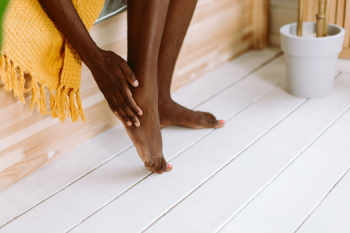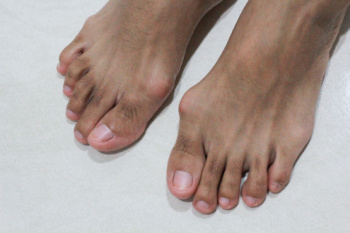Copyright © Michigan Foot and Ankle | Site Map | Nondiscrimination Policy | Design by: Podiatry Content Connection

Heel pain can stem from various conditions, including plantar fasciitis, Achilles tendonitis, or a stress fracture. Plantar fasciitis occurs when the thick band of tissue along the bottom of the foot becomes inflamed, often causing sharp pain in the heel, particularly with the first steps in the morning. Achilles tendonitis involves irritation of the tendon that connects the calf muscle to the heel, leading to pain, swelling, and stiffness, especially after physical activity. A stress fracture, often caused by repetitive stress or overuse, can result in a small crack in the heel bone, causing localized pain and swelling. Symptoms of these conditions include pain, tenderness, and swelling in the heel area, making walking or standing uncomfortable. A podiatrist can accurately diagnose the source of the pain through a physical exam, imaging tests, and by discussing symptoms. Treatment may include rest, custom orthotics, targeted exercises, or, in severe cases, surgery. If you have heel pain, it is suggested that you schedule an appointment with a podiatrist for appropriate care.
Many people suffer from bouts of heel pain. For more information, contact one of our podiatrists of Michigan Foot and Ankle. Our doctors can provide the care you need to keep you pain-free and on your feet.
Causes of Heel Pain
Heel pain is often associated with plantar fasciitis. The plantar fascia is a band of tissues that extends along the bottom of the foot. A rip or tear in this ligament can cause inflammation of the tissue.
Achilles tendonitis is another cause of heel pain. Inflammation of the Achilles tendon will cause pain from fractures and muscle tearing. Lack of flexibility is also another symptom.
Heel spurs are another cause of pain. When the tissues of the plantar fascia undergo a great deal of stress, it can lead to ligament separation from the heel bone, causing heel spurs.
Why Might Heel Pain Occur?
- Wearing ill-fitting shoes
- Wearing non-supportive shoes
- Weight change
- Excessive running
Treatments
Heel pain should be treated as soon as possible for immediate results. Keeping your feet in a stress-free environment will help. If you suffer from Achilles tendonitis or plantar fasciitis, applying ice will reduce the swelling. Stretching before an exercise like running will help the muscles. Using all these tips will help make heel pain a condition of the past.
If you have any questions please contact one of our offices located in Ferndale, and Milford, MI . We offer the newest diagnostic and treatment technologies for all your foot and ankle needs.

As individuals age, foot problems become more common and can significantly affect mobility and quality of life. Frailty and decreased motor performance contribute to issues such as reduced balance, slower walking speed, and increased risk of falls. Conditions such as arthritis, neuropathy, and poor circulation can lead to pain, stiffness, and difficulty in movement. Weakening muscles and loss of flexibility in the feet may cause instability, making everyday activities more challenging. Common problems include bunions, corns, calluses, and deformities that worsen with age. Proper foot care, wearing supportive shoes, and regular exercise can help maintain strength and function. If you are elderly and have developed foot conditions or noticed any changes to your feet, it is suggested that you are under the care of a podiatrist who can help you to monitor your foot health.
If you need your feet checked, contact one of our podiatrists of Michigan Foot and Ankle. Our doctors will attend to all of your foot and ankle needs and provide you with quality treatment.
Geriatrics and Podiatry
When people age, some common issues that may occur are bone density loss, dry skin, poor circulation, and rough brittle nails. These issues may also affect your foot health if the necessary steps are not taken to alleviate the problems.
It is important to take care of your feet because feet that are injured or diseased can affect your overall health. Having painful feet hinders your ability to do daily activities or may decrease your willingness to do the things that you need to do.
Visiting Your Geriatrician
As we age, health problems become more likely, so it is essential to visit your doctor for check-ups to ensure that you are doing the best you can to take care of your health. It is recommended to check your feet frequently for any possible cuts, bruises, swelling, corns or any other irregularities.
Taking Care of Elderly Feet
Cracked or dry feet can be treated by applying moisturizer often. It is also important not to wear old socks because the older the sock is, the higher the possibility there will be that there is bacteria there. Wear fresh socks and make sure they fit properly.
Proper foot health means that you can have a more active lifestyle and you will not be bogged down by pain. Foot health also leads to good circulation, which is paramount for overall health.
If you have any questions, please feel free to contact one of our offices located in Ferndale, and Milford, MI . We offer the newest diagnostic tools and technology to treat your foot and ankle needs.

A bunion, or hallux valgus, is a bony bump that forms at the base of the big toe. A bunion develops gradually as the big toe shifts inward toward the smaller toes and places stress on the joint. Because this joint supports a significant amount of weight while walking or standing, people with bunions often experience pain, swelling, and redness in the affected area. In some cases, calluses may form where the toes rub together. Over time, bunions can worsen, making it uncomfortable to wear regular shoes or walk without discomfort. While they are most commonly seen in adults, some children are born with bunions or develop them in adolescence. Factors such as inherited foot structure, joint deformities, and certain inflammatory conditions may contribute to bunion formation. Wearing tight or narrow shoes may not directly cause bunions, but they can aggravate existing ones. A podiatrist can assess the severity of a bunion and recommend treatment, such as supportive footwear, orthotics, or surgery if needed. If you have a bunion that is causing pain, it is suggested that you schedule an appointment with a podiatrist for an exam and appropriate treatment.
If you are suffering from bunions, contact one of our podiatrists of Michigan Foot and Ankle. Our doctors can provide the care you need to keep you pain-free and on your feet.
What Is a Bunion?
A bunion is formed of swollen tissue or an enlargement of boney growth, usually located at the base joint of the toe that connects to the foot. The swelling occurs due to the bones in the big toe shifting inward, which impacts the other toes of the foot. This causes the area around the base of the big toe to become inflamed and painful.
Why Do Bunions Form?
Genetics – Susceptibility to bunions are often hereditary
Stress on the feet – Poorly fitted and uncomfortable footwear that places stress on feet, such as heels, can worsen existing bunions
How Are Bunions Diagnosed?
Doctors often perform two tests – blood tests and x-rays – when trying to diagnose bunions, especially in the early stages of development. Blood tests help determine if the foot pain is being caused by something else, such as arthritis, while x-rays provide a clear picture of your bone structure to your doctor.
How Are Bunions Treated?
- Refrain from wearing heels or similar shoes that cause discomfort
- Select wider shoes that can provide more comfort and reduce pain
- Anti-inflammatory and pain management drugs
- Orthotics or foot inserts
- Surgery
If you have any questions, please feel free to contact one of our offices located in Ferndale, and Milford, MI . We offer the newest diagnostic and treatment technologies for all your foot care needs.
Blog Archives
- April 2025
- March 2025
- February 2025
- January 2025
- December 2024
- November 2024
- October 2024
- September 2024
- August 2024
- July 2024
- June 2024
- May 2024
- April 2024
- March 2024
- February 2024
- January 2024
- December 2023
- November 2023
- October 2023
- September 2023
- August 2023
- July 2023
- June 2023
- May 2023
- April 2023
- March 2023
- February 2023
- January 2023
- December 2022
- November 2022
- October 2022
- September 2022
- August 2022
- July 2022
- June 2022
- May 2022
- April 2022
- March 2022
- February 2022
- January 2022
- December 2021
- November 2021
- October 2021
- September 2021
- August 2021
- July 2021
- June 2021
- May 2021
- April 2021
- March 2021
- February 2021
- January 2021
- December 2020
- November 2020
- October 2020
- September 2020
- August 2020
- July 2020
- June 2020
- May 2020
- April 2020
- March 2020
- February 2020
- January 2020
- December 2019
- November 2019
- October 2019
- September 2019
- August 2019
- July 2019
- June 2019
- May 2019
- April 2019
- March 2019
- February 2019
- January 2019
- December 2018
- November 2018
- October 2018
- September 2018
- August 2018
- July 2018
- June 2018
- May 2018
- April 2018
- March 2018
- February 2018
- January 2018
- December 2017
- November 2017
- October 2017
- September 2017
- August 2017
- July 2017
- June 2017
- May 2017
- April 2017
- March 2017
- February 2017
- January 2017






